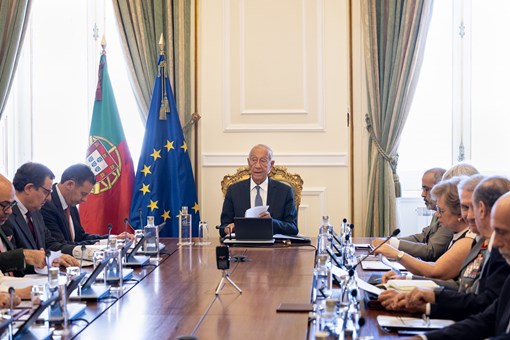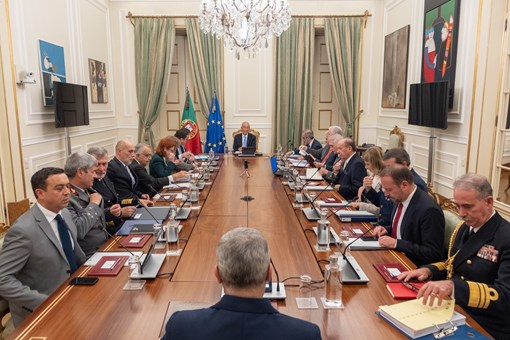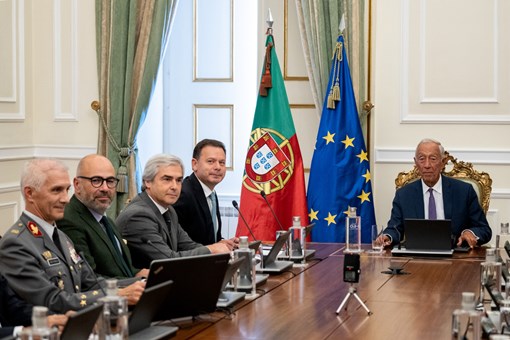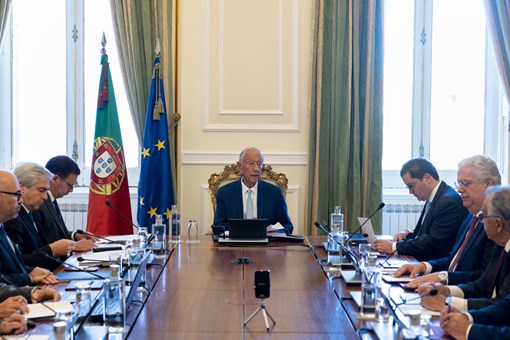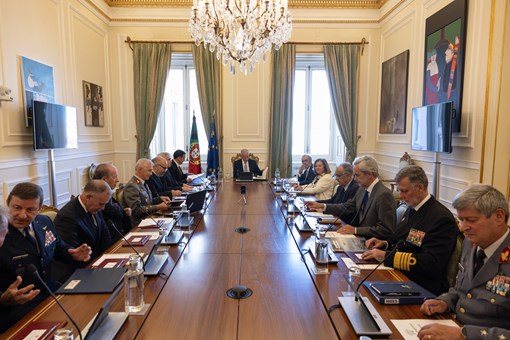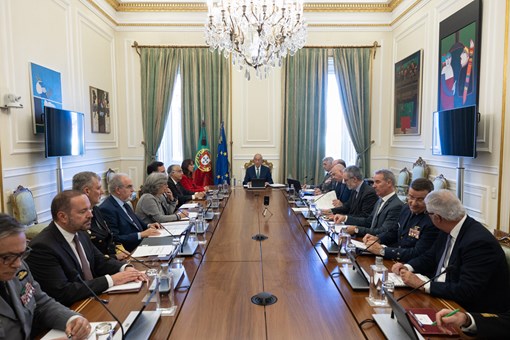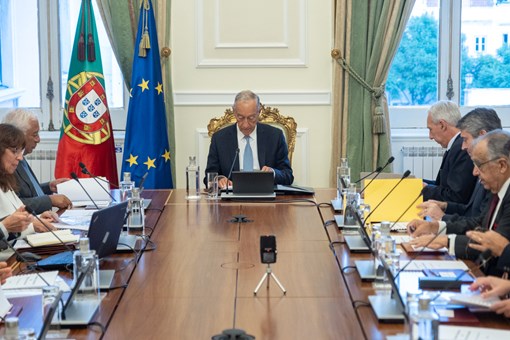Constitutional Principles
Constitution of the Portuguese Republic
TITLE X
National Defence
Article 274
The Supreme Council for National Defence
- The Supreme Council for National Defence is chaired by the President of the Republic and is composed as determined by law, and will include members elected by the Assembly of the Republic.
- The Supreme Council for National Defence is a specific advisory body on issues relating to national defence and the organisation, functioning, and discipline of the Armed Forces, and may exercise the administrative powers attributed to it by law.
National Defence Law
Organic Law no. 1-B/2009 of 7 July
CHAPTER II
Responsibilities of the bodies of State
Article 8
Bodies responsible for matters of national defence
1 — The following are directly responsible for national defence:
a) The President of the Republic;
b) The Assembly of the Republic;
c) The Government;
d) The Supreme Council for National Defence;
e) The Supreme Military Council.
2 — Besides the bodies referred to in the previous number, the following are directly responsible for the Armed Forces and the military component of national defence:
a) The Council of Chiefs of State;
b) The Chief of Defence Staff of the Armed Forces;
c) The Chiefs of Defence of the Navy, Army, and Air Force.
Article 16
The Supreme Council for National Defence
1 — The Supreme Council for National Defence is the specific collegiate advisory body on issues relating to national defence and the organisation, functioning and discipline of the Armed Forces.
2 — The Supreme Council for National Defence is chaired by the President of the Republic, who has the casting vote.
3 — The Supreme Council for National Defence is composed as follows:
a) Prime Minister;
b) Deputy Prime Minister and Ministers of State, if there are any;
c) Minister of National Defence, Minister of Foreign Affairs, Minister of Internal Administration, and Minister of Finance;
d) Ministers responsible for the areas of industry, energy, transport, and communications;
e) Chief of Defence Staff of the Armed Forces;
f) Representatives of the Republic for the Autonomous Regions;
g) Presidents of the governments of the Autonomous Regions of the Azores and Madeira;
h) President of the Commission of National Defence of the Assembly of the Republic;
i) The Chiefs of Defence of the Navy, Army, and Air Force;
j) Two Deputies to the Assembly of the Republic, elected pursuant to the terms of line r) of article 11
4 — In carrying out the duties foreseen in no. 2 of article 17, the Supreme Council for National Defence is composed exclusively of the members mentioned in lines a) to e) and i) of the previous number.
5 — The President of the Republic may, at his initiative or at the request of the Prime Minister, invite other people to participate, without the right to vote, in meetings of the Supreme Council for National Defence.
6 — The Supreme Council for National Defence meets regularly every three months and exceptionally whenever it is convened by the President of the Republic, at his initiative or at the request of the Prime Minister.
7 — The secretary of the Supreme Council for National Defence shall be a general officer or other person of recognized merit, appointed and removed by the President of the Republic, after consulting the Government.
8 — The role of Secretary of the Supreme Council for National Defence is equivalent, for all effects, to the position of director general of the first level.
9 — Support to the Supreme Council for National Defence is ensured by the General Secretariat of the Presidency of the Republic, and the funds necessary for its operation are included in the latter’s budget.
Article 17
Powers of the Supreme Council for National Defence
1 — Without detriment to the other powers attributed to it by the Constitution or by law, the Supreme Council for National Defence has authority, in its advisory role, to issue opinions on:
a) The declaration of war or negotiation of peace;
b) National defence policy;
c) The approval of international treaties in which the State assumes international responsibilities in the domain of defence, specifically treaties in which Portugal participates in international security and defence organisations, as well as treaties for peace, defence, rectification of borders, and those regarding military matters;
d) The projects and proposals of legislative acts regarding the policy of national defence and of the Armed Forces, the organisation, functioning and discipline of the Armed Forces, and the conditions of employing the Armed Forces in a state of siege or state of emergency;
e) The projects and proposals for laws on military programmes;
f) The devising of strategic planning for national defence;
g) The participation of deployments of the Armed Forces in military operations outside national territory;
h) The organisation of civil protection, assistance to the population, and safeguarding of public and private goods, in case of war;
i) Fundamental defence infrastructure;
j) Proposals regarding the mobilisation and requisition necessary to pursue the permanent objectives of national defence policy;
l) Other matters regarding national defence and the Armed Forces that are submitted by the President of the Republic, at his own initiative or at the request of the Prime Minister.
2 — Without detriment to the other powers that are attributed to it by the Constitution or by law, the Supreme Council for National Defence has the authority, in its administrative role to:
a) Confirm the strategic military concept and approve specific missions of the Armed Forces and the systems of forces necessary for fulfilling them, when proposed by the Minister of National Defence;
b) In times of war, exercise the powers provided for in article 43;
c) Approve the appointments and dismissals proposed by the President of the Supreme Military Court, operating during times of war, of commanders in chief, of military commanders or representatives in the organisation of any alliance of which Portugal is a member, as well as generals, commanding naval, army, or air forces intended to carry out international missions in that framework.
3 — The opinions of the Supreme Council for National Defence are only published when it decides to do so.
Statutes of the Supreme Council for National Defence
CHAPTER I
Nature and composition
Article 1
Definition
The Supreme Council for National Defence is a specific collegiate body to advise on issues relating to national defence and the organisation, functioning, and discipline of the Armed Forces.
Article 2
Chairman
The Supreme Council for National Defence is chaired by the President of the Republic, who is responsible for convening, as well as opening, directing, and ending the respective meetings.
Article 3
Composition
1 — The Supreme Council for National Defence, as an advisory body, has the following composition:
a) Prime Minister;
b) Deputy Prime Minister and Ministers of State, if there are any;
c) Minister of National Defence, Minister of Foreign Affairs, Minister of Internal Administration, and Minister of Finance;
d) Ministers responsible for the areas of industry, energy, transport, and communications;
e) Chief of Defence Staff of the Armed Forces;
f) Representatives of the Republic for the Autonomous Regions;
g) Presidents of the Governments of the Autonomous Regions of the Azores and Madeira;
h) President of the Commission of National Defence of the Assembly of the Republic;
i) The Chiefs of Defence of the Navy, Army, and Air Force;
j) Two Deputies of the Assembly of the Republic, elected pursuant to the terms of line r) of article 11 of the National Defence Law.
2 — The Supreme Council for National Defence, as an administrative body, is exclusively composed by the members referred to in lines a), b), c), d), e) and i) of the previous number.
3 — The President of the Republic, by his own initiative or at the request of the Prime Minister, may invite any entities to participate in meetings of the Supreme Council for National Defence, without voting rights.
Article 4
Secretary
1 — The Supreme Council for National Defence has as secretary, a general officer or other person of recognized merit, appointed and removed by the President of the Republic, after consulting the Government.
2 — The role of Secretary of the Supreme Council for National Defence is equivalent, for all effects, to the position of director general of the first level.
3 — If the Secretary of the Supreme Council for National Defence, is temporarily unable to carry out their role, he may be replaced, in an emergency, by the Head of the Casa Militar of the President of the Republic.
Article 5
Functions of the Secretary
The Secretary of the Supreme Council for National Defence is responsible for:
1) Receiving documents regarding subjects that should be previously submitted for consideration by the members of the Supreme Council for National Defence;
2) Compiling the necessary documents for studying and clarifying the subjects to be addressed;
3) Annotating, when necessary or pertinent, the documents being considered in meetings of the Supreme Council for National Defence, highlighting points or aspects that need special attention;
4) Sending, by letter, to the members of the Supreme Council for National Defence and any other entities invited, notifications of the convening of regular or extraordinary meetings, stating the date and time of the meeting, as well as the respective order of business;
5) Sending, suitably in advance, the documents regarding the subjects to be addressed, providing their security classification allows it, to the members of the Supreme Council for National Defence and any other entities invited;
6) Allowing the members of the Supreme Council for National Defence and any other entities invited, while respecting the security standards in effect, to consult the documents regarding subjects to be addressed whose security classification requires special treatment;
7) Writing the meeting minutes and, as decided, the opinions of the Supreme Council for National Defence;
8) With the President of the Republic, the members of the Supreme Council for National Defence, and other entities, addressing all matters for which information, clarification or action may be necessary, both to prepare meetings and facilitate the functioning of the Council, and the implementation of its decisions;
9) Publishing the deliberations and views of the Supreme Council for National Defence, as determined;
10) Providing the technical and administrative support needed for the functioning of the Supreme Council for National Defence and guiding the implementation of tasks and the archiving of documents.
Article 6
Term
The members of the Supreme Council for National Defence maintain their positions as long as they hold offices which, pursuant to the law, confer them a seat on this body.
Article 7
Temporary substitution
If temporarily impeded from carrying out their roles, the President of the Republic and the members of the Supreme Council for National Defence are replaced by whoever constitutionally or legally substitutes them in the role of president or in carrying out the role which the member of Supreme Council for National Defence holds.
Article 8
Substitution in the case of accumulation of functions
In the event that a member of the Supreme Council for National Defence has accumulated functions, the higher-ranked function should take precedence, if there is no reason to fill the other positions.
CHAPTER II
Powers
Article 9
1 — When exercising its advisory functions, the Supreme Council for National Defence is authorised to issue opinions on the following subjects:
a) The declaration of war or negotiation of peace;
b) National defence policy;
c) The approval of international treaties in which the State assumes international responsibilities in the domain of defence, specifically treaties in which Portugal participates in international security and defence organisations, as well as treaties for peace, defence, rectification of borders, and those regarding military matters;
d) The projects and proposals of legislative acts regarding the policy of national defence and of the Armed Forces, the organisation, functioning and discipline of the Armed Forces, and the conditions of employing the Armed Forces in a state of siege or state of emergency;
e) The projects and proposals for laws on military programmes;
f) The devising of strategic planning for national defence;
g) The participation of deployments of the Armed Forces in military operations abroad;
h) The organisation of civil protection, assistance to the population, and safeguarding of public and private goods, in case of war;
i) Fundamental defence infrastructure;
j) Proposals regarding the mobilisation and requisition necessary to pursue the permanent objectives of national defence policy;
k) Other matters regarding national defence and the Armed Forces that are presented by the President of the Republic, at his own initiative or at the request of the Prime Minister.
2 — When exercising its administrative functions, the Supreme Council for National Defence is authorised to:
a) Confirm the strategic military plan and approve specific missions of the Armed Forces and the system of forces necessary for fulfilling them, after a proposal by the Minister of National Defence;
b) In times of war, exercise the powers provided for in article 43 of the Law of National Defence;
c) Approve the proposed appointments and dismissals of the commanders in chief.
3 — The opinions of the Supreme Council for National Defence are only published when it decides to do so.
CHAPTER II
Procedure
Article 10
Ordinary meetings
1 — The Supreme Council for National Defence meets, regularly, every three months.
2 — The meetings should be convened, except in cases of exceptional urgency, with minimum notice of 3 working days.
Article 11
Extraordinary meetings
1 — The Supreme Council for National Defence meets extraordinarily whenever it is convened by the President of the Republic, at his own initiative or at the request of the Prime Minister.
2 — The convocation, with minimum prior notice of forty-eight hours, should specify, expressly, the matters to be addressed in the meeting.
Article 12
Agenda
1 — The agenda of each meeting is established by the President of the Republic.
2 — The Prime Minister can request the President of the Republic to include items that the Government believes should be discussed.
3 — The agenda should be delivered to all members no less than 48 hours before the date of the meeting.
Article 13
Meeting format
The Supreme Council for National Defence always operates in plenary meetings, without prejudice to the provisions of no. 2 of article 3
Article 14
Quorum
1 — The Supreme Council for National Defence can only function at the first call if a majority of the legal number of its members with the right to vote is present.
2 — If, at the first call, the required quorum is not met, a new meeting is convened, with a minimum interval of 24 hours, with the invitation stating that the Supreme Council for National Defence will deliberate as long as a third of the members are present.
Article 15
Voting
1 — The Supreme Council for National Defence takes decisions by nominal vote, with opinions and decisions determined by the votes of all the members present.
2 — Members who are present at the meeting may not abstain, except those whom the decision impacts directly.
3 — Voting declarations are allowed, with a brief mention of their justification.
4 — The President of the Republic has the casting vote.
Article 16
Minutes of the Meeting
1 — From each meeting, the minutes are written, containing a summary of everything that happened in it, indicating, namely, the date and location of meeting, the matters considered, the opinions and decisions approved, and the form and result of the respective votes.
2 — The draft minutes of each meeting will be written by the Secretary, which sends them to the members of the Supreme Council for National Defence for approval at the beginning of the following meeting, unless the Council decides the drafting and approval of the minutes in the meeting they refer to.
3 — The minutes, after being written in the respective book of minutes, will be undersigned by the Secretary, and signed by the President of the Republic.
4 — The minutes of the Supreme Council for National Defence cannot be consulted or published, for a period of 30 years counting from the end of the presidential mandate in which the meeting they refer to were held.
5 — The consultation and publishing of the minutes are reserved, wholly or in part, in exceptional cases, by decision of the President of the Republic.
6 — After the aforementioned period of 30 years, the consultation and publishing of the minutes may be undertaken by request to the President of the Republic.
7 — The consultation and publishing of the minutes, under the terms of previous numbers, will always be ensured by the Secretary of the Supreme Council for National Defence and by the services of the Presidency of the Republic.
Article 17
Meeting location
The meetings of the Supreme Council for National Defence take place in the installations of the Presidency of the Republic, unless another location is designated by the President of the Republic.
Article 18
Support services
1 — The Secretariat of the Supreme Council for National Defence operates in the facilities of the President of the Republic.
2 — Technical and administrative support to the Supreme Council for National Defence is assured by the General Secretariat of the Presidency of the Republic, and the funds necessary for its operation are included in the latter’s budget.
CHAPTER IV
Disclosure
Article 19
Duty of confidentiality
1 - The meetings of the Supreme Council for National Defence are not public.
2 - The members and participants in the Supreme Council for National Defence and the Secretary have a duty of confidentiality regarding the subject and content of the meetings.
Article 20
Disclosure of meetings’ content
1 - The President of the Republic may authorize the publication of items on the agenda that have not been assigned a security classification.
2 - The President and the Supreme Council for National Defence may agree on the publication, after the meetings, of an information note, in which all or part of the subject of the meeting and its results are briefly indicated.
Article 21
Publication
1 - The opinions of the Supreme Council for National Defence are not published, except when determined by the Council itself.
2 - The acts performed by the Supreme Council for National Defence pursuant to paragraph 2 of article 9 are only published in the case of paragraph c), which take the form of a resolution.
CHAPTER V
Final provisions
Article 22
The Rules of Procedure of the Supreme Council for National Defence may be amended by a two-thirds majority of its members in office.
Approved by the Supreme Council for National Defence on 14 December 2017.
Published.
The President of the Republic, Marcelo Rebelo de Sousa.

